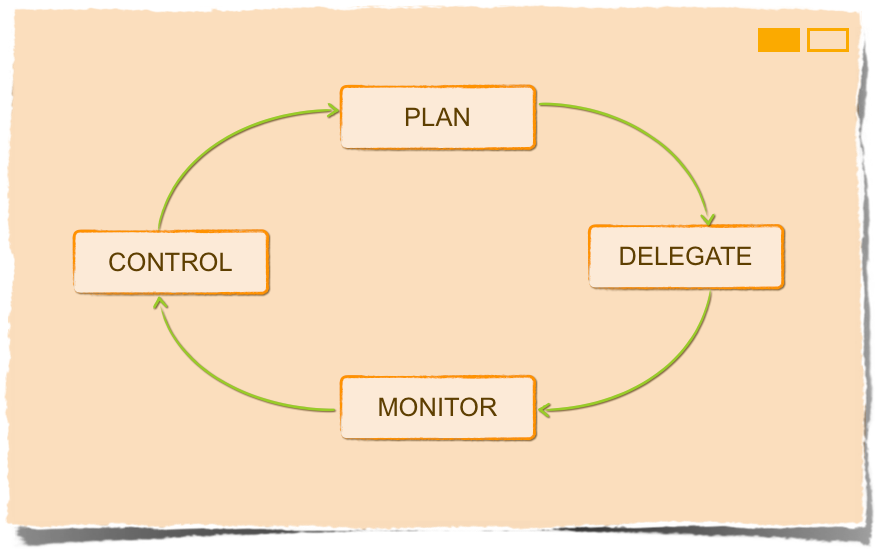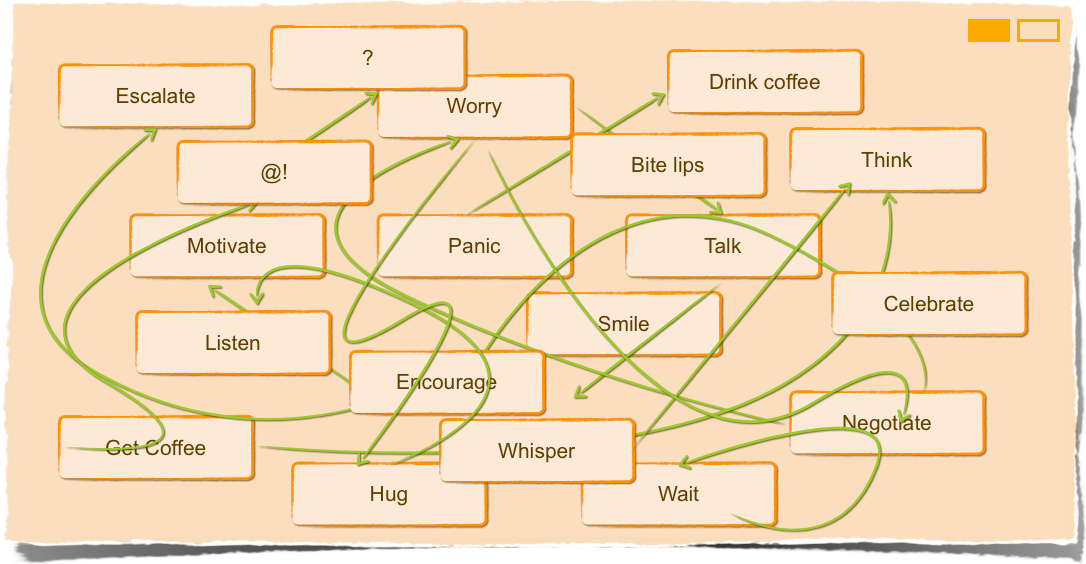Defining Project Management
There are lots of ways of looking at and discussing project management. This section will focus on providing clarification regarding common (and not so common) project management (related) definitions, concepts and terms.
What is the importance of different project types?
Now that we have established that there are different types of projects as well ways of identifying those, we need to answer the question what the importance of knowing the project type is.
As we have seen from the different attributes that determine the type of project, the main reason to know/determine the project type is that each requires a different leadership and management style.
Ralf Müller and Rodney Turner in a 2006 study in the International Journal of Project Management conclude that:
Without going too much into detail this conclusion makes a lot of sense as we can all appreciate that different situations require different approaches.
Looking at some of the project types they conclude as well:
- On medium complexity projects, emotional resilience and communication are important;
- On re-positioning projects, motivation is important, whereas on renewal projects, self-awareness and communication are important;
- On fixed price contracts, sensitivity and communication are important, whereas on re-measurement contracts influence and communication are Important;
- On home-based, multi-cultural projects, motivation and managing resources are important and strategic perspective detrimental.
So what does this mean?
It means a few things, first of all, something Müller and Turner do not address and that is, from the project manager's perspective, that you need to know what your strengths and weaknesses are. This may sound self evident and somewhat corny but it is very important because we as project managers have a tendency not to (be able) to say no and to take on any project that comes our way.
Secondly, now from the perspective of the Project Manager's manager, make sure to select the right project for the right project manager.
Lastly, from an project management office and organizational development perspective, when developing project managers and project management capabilities make sure to adopt the curricula to fit the expected project types and to address leadership (style) development.
Sources:
- Müller, R., & Turner, J. (2007). Matching the project manager’s leadership style to project type. International Journal Of Project Management, 25(1), 21-32. doi:10.1016/j.ijproman.2006.04.003
What does a Project Manager do?
In its most simple form a project manager does the following:
In essence the traditional Deming cycle of Plan-Do-Check-Act with a few name changes.
Key to the changes is that a project manager manages the project but does not do (most of) the project work himself.
In subsequent chapters we will delve deeper into each of these and provide more insight in what to do, how to do it, when to do it and most importantly why (or why not) to do it.
In all fairness we need to point out that the real things a project manager does can be be depicted as seen below:
We like to point out that the IPMA Competence Baseline (ICB®) provides a good overview of what a project manager is supposed to be able to do.
What is a Project?
This may seem a simple question with a simple answer but when we look at the multitude a definitions of what a project is, one might start to wonder if we can ever nail it down. Luckily when we look at some of the definitions there are some common characteristics.
First let's have a look a couple of definitions.
A project can be considered to be any series of activities and tasks that:
- Have a specific objective to be completed within certain specifications
- Have defined start and end dates
- Have funding limits (if applicable)
- Consume human and nonhuman resources (i.e., money, people, equipment)
- Are multi-functional (i.e., cut across several functional lines)1
A project is a sequence of unique, complex, and connected activities having one goal or purpose and that must be completed by a specific time, within budget, and according to specification.2
A project is a unique process consisting of a set of co-ordinated and controlled activities with start and finish dates, undertaken to achieve an objective conforming to specific requirements, including constraints of time, cost and resources.3
A project is a temporary organization that is created for the purpose of delivering one or more business products according to an agreed Business Case.4
A project consists of a unique set of processes consisting of coordinated and controlled activities with start and end dates, performed to achieve project objectives. Achievement of the project objectives requires the provision of deliverables conforming to specific requirements.5
A project is a temporary endeavour undertaken to create a unique product, service, or result.6
The two elements we see in each definition, albeit slightly different worded are: time bound and result oriented. In other words to create something within a certain time-frame. Other elements refine this by adding a specific focus - the business (case) - or approach - resources and control.
Another way of looking at it is by asking the question, "What is not a project?"
Not a project is running the organization on a daily business (unless you are in the project management business ;-). Changing the way the business is run can be considered a project.
Not a project is repetitive work such a operating a production line. Making (major) changes to the production line can be considered a project.
Not a project is the (dis)embarkation of passengers at the end/start of a cruise vacation. Improving the (dis)embarkation process for each port of call can be considered a project.
Running a charitable organziation on a daily basis is not a project. The annual major fundraising campaign can be considered a project
In other words, steady state, recurring stuff usually is not a project. Unique and/or major (recurring) stuff can be considered a project.
Finally, does it really matter? We can say that if one does all, or most of, the things considered to be within the domain of a project manager one is managing a project. We can also say, if they (whoever that may be, your boss, the management team, the board) call it a project you better do, or be able to do, whatever it is project managers are considered to be doing! In one of the following articles we will address that (whatever a pm is supposed to do/be doing).
See also:
Sources
1. PROJECT MANAGEMENT, A Systems Approach to Planning, Scheduling, and Controlling. Harold Kerzner, 8th Ed. ISBN 0471225770 John Wiley & Sons, Inc. 2002
2. Effective Project Management, Third Edition by Robert K. Wysocki and Rudd McGary ISBN:0471432210 John Wiley & Sons © 2003
3: ISO 10006:2003. Quality management systems - Guidelines for quality management in projects, 2003
4. Prince2. Managing Successful Project with Prince2, The Stationary Office, 2009
5: ISO 21500:2012. Project Management - Guidance on project management, 2012
6: A guide to the Project Management Body of Knowledge, 5th Ed. 2013{jcomments on}
What is a Project Manager
One who manages projects is a project manager! Is that true? In other words, anyone who manages a project or projects is a project manager? As per the defnition, yes. A project manager manages projects. However, one can and should argue that, the simple fact one is called a project manager or the simple fact that one manages projects does not make one a project manager!

Let us explain this.
First of all we have to consider whether the project is indeed a project. See What is a project? If whatever it is one manages does not fit the definiton of a project one can not be considered a project manager.
Secondly, the activities one does need to constitute "managing". See What is Project Management? In other words, if whatever it is one does cannot be considered "managing or taking care of or or handling", one can not be considered a project manager.
The next problem we encounter with this is that the term/profession 'project manager' is not a protected/regulated profession such as medical doctor or engineer, nurse or Colonel. Nor does it appear in many national and international job classifications. Anyone can call herself a project manager. Subsequently a lot of people do. A lot of them would not pass the simple litmus tests above. This (self) proclaiming and naming problem will not be solved (does it need solving?) unless there is a need to do so. So far that does not seem the case.
Good efforts are being made worldwide in defining what a project manager is or should be. Some examples are the IPMA Competence Baseline (ICB®) and the GAPPS Project Manager Standard. Both PMI's A Guide to the Project Management Body of Knowledge (PMBOK®) and ISO's ISO 21500:2012 Guidance on project management do mention the role of the project manager but not in depth.
For all purposes and intent we will stick with the simple definition of a Project Manager being someone who manages a project. In subsequent chapters we will explore a bit more what makes project manager differ from other managers and types of skills, competences and attitudes a project manager may want to posses and/or develop.




